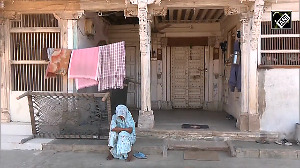
A general election in India is a gigantic exercise, equivalent to conducting polls in Europe, the United States, Canada and Australia all at once. So claims a report from the National Commission on Electoral Reforms that reviewed laws, processes and reforms.
The Lok Sabha election next month will be enormous not just in size, but in cost as well. rediff.com explains just how costly.
How much does it cost the government to conduct a general election?
The interim budget that Union Finance Minister Jaswant Singh presented in February put the cost to the exchequer of the parliamentary election next month at Rs 818 crore (Rs 8.18 billion). But if the huge expense of conducting a similar exercise in 1999 is anything to go by, it is likely to go up to as much as Rs 1,000 crore (Rs 10 billion or approximately $223 million).
How much did the 1999 Lok Sabha election cost?
Approximately Rs 880 crore (Rs 8.8 billion or about $196.4 million).
Has there been a significant increase in election expenditure over the years?
Yes. The government has come out with the official expenditure figures for Lok Sabha elections since 1967. In 1967, the exercise cost the exchequer only Rs 1.79 crore (Rs 17.9 million). This figure rose steadily to Rs 11 crore (Rs 110 million) in 1971, Rs 23 crore (Rs 230 million) in 1977, Rs 54 crore (Rs 540 million) in 1980, Rs 81 crore (Rs 810 million) in 1984 and Rs 154 crore (Rs 1.54 billion) in 1989.
The government's election expenses shot up enormously in the 1990s, to Rs 359 crore (Rs 3.59 billion) in 1991, Rs 597 crore (Rs 5.97 billion) in 1995, Rs 666 crore (Rs 6.66 billion) in 1998, and Rs 880 crore (Rs 8.80 billion) in 1999.
How does the government draw up a budget for the election?
The Election Commission prepares a budget, which is approved by the government. The Union finance ministry usually accepts the Commission's budgetary recommendations without much change. If elections are being held only for the Lok Sabha, the expenditure is borne entirely by the central government. But if elections are being held to a state legislature, the expenditure is borne entirely by the state government concerned.
What are the main heads of expenditure in an election?
The biggest costs are incurred on deployment of security personnel and polling staff, setting up polling stations (some 800,000 throughout the country for a general election), purchase of electronic voting machines, and issuance of photo identification cards.
Does the government's election budget include the money that political parties spend on their campaigns?
No. The election budget covers only the government's expenses on conducting the polls.
Political parties spend much more than what the government has earmarked for the actual conduct of the polls. The campaign expenditure of political parties has also been growing over the years. But no accurate figures of this spending are available.
Also Read: How do parties collect money?
Are there no legal limits on the amount of money a candidate can spend?
There are strict legal limits on the amount of money a candidate can spend on an election campaign. According to the Election Commission's rules, in bigger constituencies a candidate can spend up to Rs 25 lakh (Rs 2.5 million). In other constituencies, it varies between Rs 10 lakh (Rs 1 million) and Rs 25 lakh.
Can supporters of a candidate or political parties spend additional money on their campaigns?
Supporters of a candidate can spend as much as they like to help out with a campaign. But they have to get the candidate's permission in writing to do so.
While parties are allowed to spend as much money on campaigns as they want, recent Supreme Court judgments have said that unless a political party can specifically account for the money thus spent, it will be added to the election expenses of the candidates concerned. The accountability thus imposed on candidates and parties has curtailed some of the more extravagant campaigning that used to be a feature of Indian elections.
How then do candidates routinely overspend on their campaigns? Are there any loopholes?
Yes. The most significant one lies in Explanation 1 to section 77(1) of the Representation of the Peoples Act 1951, under which amounts spent by persons other than the candidate and his agent are not added to his/her election expenses. This means a candidate can spend as much as he likes without violating the ceiling on poll expenses. All additional expenditure, when revealed, can be attributed to the party or friends of the candidate.
Do political parties and candidates have to prepare audited accounts of their campaign expenses?
Yes. Political parties as well as individual candidates are subject to a proper statutory audit of the monies spent by them. After the election process is complete, each candidate has to submit an audited statement of expenses, head-wise. The audit is enforced by the Election Commission which appoints a council of at least two auditors for, say, every 10 constituencies. Any violation or misreporting of expenses can result in disqualification of the candidate concerned.
Have there been any moves to curtail the rising election expenses?
A national commission that reviewed electoral laws in India three years ago said there should be a serious attempt to curb spending on elections. For this, it recommended changing the ground rules for campaigns, partly by encouraging the use of electronic and digital technology to campaign at state cost and, simultaneously, banning other overt, wasteful tamashas.
EARLIER IN THIS SERIES:
What is the Model Code of Conduct?
What is an election symbol?
What is the Election Commission?
What does dissolution of Parliament mean?






 © 2025
© 2025